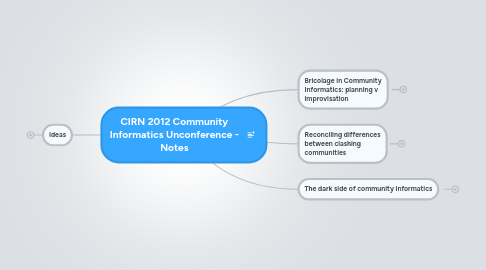
1. Bricolage in Community Informatics: planning v improvisation
1.1. How do we tell stories, whether in formal reports or digitally mediated narratives? are we working with intuition, instinct, or something else? are we ‘scientists’? philosopher-kings? magicians? technocrats? or something else? To what degree then are some of us engaged in an ‘anti-discipline’ against the formal strictures of what is the written or contractual score? Is it possible to impart the skills that we have, or is every project or initiative a highly personal ‘riff’? do we pretend to have discipline and skills?
1.2. Discussion
1.2.1. Methodologies
1.2.1.1. Storytelling key concept
1.2.1.1.1. Good stories, bad stories, stories don't necessarily lead anywhere
1.2.1.2. Imageries
1.2.1.3. Different people, different understandings, rich conversations
1.2.1.4. Bring in performing arts
1.2.1.4.1. music, murals, performance arts combined with tech
1.2.1.5. Development studies, multiple methodologies
1.2.1.5.1. Many lessons to be learnt
1.2.1.6. Bricolaging
1.2.1.6.1. Map out assets in participatory way
1.2.1.6.2. Social capital
1.2.1.6.3. Asset-based devt methodologies
1.2.1.6.4. Describe the resources people have at hand to tinker with
1.2.1.6.5. Resources and practices
1.2.1.6.6. Dynamic process, fluid, organic, juxtaposed
1.2.1.7. Design thinking movement
1.2.1.7.1. industrial design community
1.2.1.7.2. agilemethods software engineering
1.2.1.7.3. Book: Design Thinking
1.2.1.8. Radical archivists
1.2.1.8.1. Memory past, present, future
1.2.1.9. Advocacy
1.2.1.9.1. In India at grassroots level
1.2.1.9.2. Transformative element to what you are doing
1.2.1.9.3. Who are the communities?
1.2.1.9.4. Diversity
1.2.2. Epistemology
1.2.2.1. Equal echange of ideas
1.2.2.1.1. Getting beyond the idea of _the_ expert, everybody brings in expertise, start at grassroots level (e.g. First Mile)
1.2.2.1.2. We need to reshape how we see ourselves and others
1.2.2.1.3. After inviting people 'from the other side', perspective of research meetings completely changed, way of thinking changed. Constant weekly meetings with people not from your field. Then you learn how to deal with this.
1.2.3. Axiology
1.2.3.1. Ethics
2. Reconciling differences between clashing communities
2.1. In practice, many communities do not interact, but clash (better: tension). How to avoid such clashes? How to deal with the differences in community cultures? What are early-warning signs for a collision course? If conflict has broken out after all, how to best resolve it?
2.2. Discussion
2.2.1. As a person working with communities you need to be independent, often impossible not to get involved in faction
2.2.1.1. Only way is experience
2.2.1.1.1. recognize clashes before they come
2.2.2. Clashes often temporary, resolve themselves
2.2.3. Clash is (generally) too strong a word, tension is a more generic term
2.2.4. Any journey of a community results in tension as part of developmental cycle
2.2.5. Tension between social and technical in our own CI community
2.2.5.1. Socio-technical divide much more often than digital divide
2.2.5.2. Bridge the gap, interdisciplinary teams & themes
2.2.6. Be aware who youre working for
2.2.6.1. Reflective practice why you made decision who youre working for
2.2.6.2. Power is always there, understand it
2.2.6.3. Cross-cultural
2.2.6.4. Talk to others
2.2.6.5. When you enter a field people need to know who you are and what you bring, brings in engagement
2.2.7. Everybody personal techniques for introducing yourselves, tools & tricks
2.2.7.1. Once you have the trust going its much easier
2.2.7.2. You need skills and be responsible
3. The dark side of community informatics
3.1. What are the dark sides of communities? What processes are needed to inoculate communities against such disruptive behaviours? How to balance a healthy sense of identity with a much needed sense of the relativity of the community's outlook and social norms?
3.1.1. "Negotiate" instead of "inoculate"
3.2. Discussion
3.2.1. Sharing your methods with others is one way to deal with snake oil
3.2.2. You need to be clear about ethical behaviour
3.2.3. Technology has politics
3.2.3.1. e.g. Google search
3.2.3.2. Langdon Winner: Do Artefacts Have Politics
3.2.3.3. Facebook as a metaphor for _supposedly_ open technologies
3.2.3.4. Even our own well-intended tools may be abused
3.2.3.5. Loss of generativity of Internet
3.2.3.5.1. Jonathan Zittrain: Future of Internet
3.2.3.6. Community should be able to negotiate having control over its information
3.2.3.6.1. Internet open model may not always fit
3.2.3.6.2. Ownership, access, control and possession
3.2.3.7. Careful about what info we collect, e.g. government
3.2.3.8. Disruptive technologies
3.2.3.8.1. Negative versus positive disruptive behavior
3.2.3.8.2. Amish comunities not completely against technology but very much on their own terms
3.2.4. Joseph Schumpeter
3.2.4.1. theory of creative destruction
3.2.4.2. Destrruction/disruption has its role to play
3.2.5. Freedom of expression
3.2.5.1. India cartoonist against politician. Google had to stop search
3.2.5.2. Who is in control?
3.2.6. How to deal with inter-community tensions
3.2.6.1. Respect, ethics, conversation, common football ground
3.2.6.1.1. Partnership development
3.2.6.2. Negotiating common space
3.2.6.3. Awareness of things you cannot and should not do
3.2.6.3.1. ICT exacerbates
4. Ideas
4.1. Online video series of interviews with key individuals
4.1.1. cf TED talks
4.1.1.1. TED has great guide how to videorecord
4.1.1.1.1. It's not just the content, but also the style etc
4.1.2. TEDx CIRN: what community informatics has to offer show it to the world
4.1.3. CIRN wiki profiles recorded with web cams
4.1.4. 5 minute segments
4.2. Continue conference on wiki, Facebook, etc-
4.2.1. goals: grow community, conference attendance, sharing materials
4.2.2. Wiki tutorials?
4.3. ICT4D Dictionary
4.3.1. Call for contributions: 6000 words before January
4.3.2. published by John Wiley
4.3.3. Mario Marais editor of ICT4D & Sustainability, contact him if you want to contribute ([email protected])
